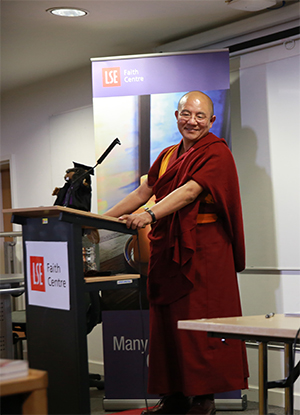How Buddhism Views Happiness?
Many of us can spend our whole lives searching for happiness. The list of things that can bring us happiness never runs short: love, fame, money, power, health, etc. Are you sure you are going to be happy even when all items on this “happiness list” have been checked? The ancient wisdom of Tibetan Buddhism teaches us to rely on inward contemplative methods and not to rely on any external objects to experience our internal, innate happiness.
How to Be Happy Through Meditation?
Excerpt 1: The Buddhist View on Financial Management
In Samyuktagama Sutra we find advice well suited for today’s financial management. For example, it says that the money that we earn should be split into four portions: one fourth is to be used as living expense; one fourth to be saved up; one fourth for philanthropic purposes; and the remaining one fourth, for investment or business. This is the Buddhist point of view on financial management.
Excerpt 2: The Buddhist View of Social Life
The Sigalovada Sutta says that not all Buddhists are required to take monastic ordination or take solitary retreats. Instead, lay Buddhists should stay in the cities and live a normal life. This sutra also teaches Buddhists how to keep good relationships with one’s spouse, parents, siblings, superiors, subordinates, and friends.
Excerpt 3: The Buddhist View of Political Life
Buddhism also sets forth a moral code of conduct for rulers or governors. Many sutras promote a society of equality, peace, and nonviolence, as well as ways to make a country prosperous and its people happy and contented.
Excerpt 4: How Does Overloaded Information Affect Us?
We have limited room in our mind. When it is overwhelmed with information, our normal way of thinking gets corrupted. Our mind, being occupied and overwhelmed by myriad news, will become a jumble.
Excerpt 5: How to Get Rid of Negativity?
Our innate joy can be experienced by everyone, whether from the East or West, or being rich or poor. When our mind becomes settled, all kinds of discursive thoughts dissolve into mind’s own nature, and we will no longer be enslaved by emotions and delusive thoughts.
Excerpt 6: How to Be Happy Through Meditation?
When practicing meditation, calm your mind and observe it, and right there you may recognize your own mind. Ordinary thoughts and emotions are like the stormy waves rolling on the surface of the ocean, but they are not the true face of the mind. Our mind’s nature is like the hidden depth of the ocean, serene and profound; if we become familiarized with our mind through meditation, we will be free from all the anguish and anxiety that people experience.

How to Get Rid of Negativity
Our innate joy can be experienced by everyone, whether from the east or west, or being rich or poor. When our mind becomes settled, all kinds of discursive thoughts dissolve into mind’s own nature, and we will no longer be enslaved by emotions and delusive thoughts.

The Buddhist View of Social Life
The Sigalovada Sutta says that not all Buddhists are required to take monastic ordination or take solitary retreats. Instead, lay Buddhists should stay in the cities and live a normal life. This sutra also teaches Buddhists how to keep good relationships with one’s spouse, parents, siblings, superiors, subordinates, and friends.
“I believe a lot of people pursue happiness in the wrong way. They tend to search outwardly, which is like kids chasing after the rainbow. The more desperately they try, the further away the attainment of happiness. However, should they search inward, happiness is within reach at every moment.”
















